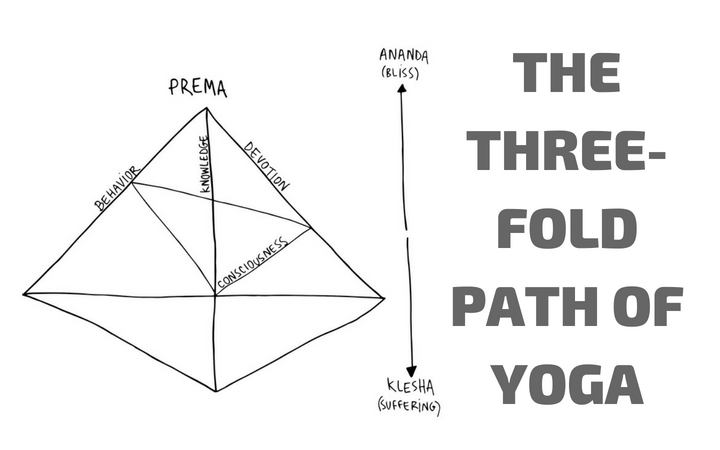In Yoga, we’re not afraid of the Devil. Instead, we’re afraid of ignorance.
Tag: yoga

The Two Paths Of Yoga
Though yoga seems complex and we find so many different presentations of yoga, there are actually only two distinct paths of yoga which we will outline here.

The Threefold Path Of Yoga
One way to look at the path of yoga is to divide it into three separate aspects, or avenues of progress. Let’s take a look at that here and how we can apply this to our lives.
In Patanjali’s Yoga Sutras we find an interesting definition of 3 things we need to be successful in yoga. Let’s take a look at that here.
Come to Belgium with me! I’ll be teaching every day, except Sundays, about the Bhagavad-gita and the 3T Path in a yoga teacher training course, in a beautiful castle in Belgium! The course is from the 1-29 of June 2018. Details and sign-up here: http://bhaktivedantacollege.com/events/yoga-teacher-training-course/!
The course is being organized by Bhaktivedanta College with Yoga Alliance RYT 200 certification. The students will have a deep and transformative experience, in a fairy-tale setting.
The castle is surrounded by quaint villages and rolling pastures in the heart of Belgium. The teachers are all dedicated spiritualists, with decades of experience and practice of yoga.
One of the asana teachers is the world-famous Gokulachandra. Check out his Instagram if you haven’t heard of him: https://www.instagram.com/gokulacandra/. And his teacher, Jayananda will also be there teaching asanas. He’s got a Ph.D. in religion and recently published a book, Inner Yoga.
I’ll be teaching a month-long course on the Bhagavad-gita, based on the version published recently by my spiritual master, H.D. Goswami, Comprehensive Guide to Bhagavad-gita with Literal Translation. I’ll be explaining the whole Bhagavad-gita with an emphasis on the practical application of the knowledge to transform our day-to-day lives, using the approach contained in The 3T Path.
The course will be entirely in English and previous experience in yoga is required.
More details and sign-up here: http://bhaktivedantacollege.com/events/yoga-teacher-training-course/! There is a 200 Euro discount if you sign-up before January 15, so hurry up!

Equanimity
The foremost quality of a yogi emphasized in the Bhagavad-gita is equanimity – to be equal, remaining the same, no matter what life throws at you. How is this to be achieved?
The secret for advancing in equanimity is to change the focus of who you are, and what matters to you. Clearly, you cannot experience equanimity if you’re on the “surface” of life. Materially speaking, everything is changing. Ups and downs, day and night, hungry and satiated… superficially speaking, things are just different all the time. If you’re fixed on the idea of how the world should be, how things must turn out and how people around you should behave, there is zero hope for equanimity, zero hope for a peace and well-being.
But we need not be superficial, because we are actually not on the surface. Our existence is not happening skin-deep. Your consciousness is not material. It’s something else entirely.
By focusing on values, purposes and meaning, you are no longer operating on the surface level. The deeper the importance you attribute to your core values, purposes and meaning, the less affected you’ll be by the surface variations life throws at you. What external events bring you and what others do does not affect your core values. Your response will be aligned with your values, and you’ll continue to find purpose and meaning by acting with such integrity. Thus, you remain stable, equal, in all situations.
As you get deeper and deeper into your values, purposes and meaning you’ll enter the stage of transcendence, where pure equanimity can be achieved. Surface variations, variations of external material reality, are ultimately inconsequential for the transcendental soul. The soul, the real you, is operating in another frequency. The more you advance, the more you’ll experience this. What the soul needs to be joyous has no connection with matter.
The Bhagavad-gita also tells us that the yogi has joyous and unlimited happiness. Practicing equanimity means experiencing bliss, no matter the challenges life is bringing to you on the surface.
In fact, the single most important way to gauge your spiritual advancement is to observe your level of equanimity. How stable is your well-being? How long does it take you to regain your harmony and inner peace when you’re confronted with some type of adversity? Are you like a little row boat, thrown every which way by the stormy seas, or like a submarine, indifferent to storms on the surface?
Embrace the challenges life sends you as a golden opportunity to practice equanimity and become stronger and more joyous, more and more focused on what really matters in life.
Check out my video on equanimity here.
What they’re saying about my new book:
“In this book, Giridhari Das offers an invaluable present to humanity. Works such as this are true treasures – manifestations of divine compassion in the service of dharma, the higher purpose. I would also say that The 3T Path is a practical survival guide in difficult times.” – Sri Prem Baba

Detachment
Detachment is a crucial quality in the path of yoga. But to many of us, it sounds so cold. Being detached would seem like we just don’t care. So, how are we to understand detachment?
In the Bhagavad-gita, Krishna says that we need three things to advance in yoga: detachment, practice and a effective method. And in the Yoga Sutras, Patanjali says we need detachment and practice. So, there is no getting around the need for detachment. It’s crucial for your wellbeing, what to speak of your self-realization.
Here’s an excerpt from my soon to be published book, The 3T Path:
“As you advance spiritually, you’ll also develop detachment. You’ll be less bothered by adversity or thrilled by good outcomes. You’ll understand that you’re not your body and that all living beings are eternal souls, immune to any material situation and safely under the watch of our loving Father. You’ll understand that nothing belongs to you, that whatever you have is only on loan. Ultimately, you’ll understand that as a soul, you require nothing from this world, as you lack nothing. You are complete and whole as you are – an eternal and unchangeable fact of existence. You have zero to lose, zero to fear.”
Detachment, thus, is the ability to accept reality as it is and focus on your actions, not the reactions you experience. Detachment means you’re focused on the internal, not external. By internal I mean your own state of mind, your goals, your focus, your motivations and your deeds. The detachment arises from the realization that you can only control yourself, your thoughts and your actions. You cannot control the world. And we certainly cannot control how others act.
Detachment is so powerful, because it aligns you with the obvious reality of our field of control and action. The more you advance in the 3T Path, the more you understand you need not fear for tomorrow, and you need not expect life to happen one way or another. You can let life flow, confident that you are equiped to deal with it, whichever way it takes you.
Detachment doesn’t mean you do not care or, worse, that you cannot love. To the contrary, you cannot love if you not detached. Detachment gives you the freedom to love purely, solely interested in what’s best for the one you love. To the degree you’re not detached, to that degree you cannot claim to love purely. Your expectations of a return for your love and service, tarnish the relationship.
Check out my video on the topic of detachment here.



